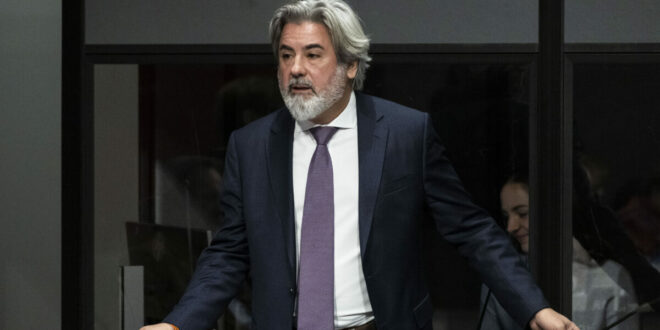Bill C-11 called a “grab of power over human communications” by a former CRTC commissioner
Senate Committee Rewrite Bell C-11The Internet Broadcasting Act proposed by Prime Minister Justin Trudeau’s government, after passing the third reading in the House of Commons in June. The Senate has been petitioned by several large companies to amend the bill, including YouTube, Apple Music and Spotify.
The Senate Standing Committee on Transportation and Communications has put forward 100 different amendments to the bill, which aims to update broadcasting law to fit the current digital environment.
The government has Promotion The bill as a way to make Canadian content more visible and to prioritize the needs and interests of Canadians, saying the last major broadcast law reform was in 1991, before the advent of online streaming services.
Gives the bill Canadian Radio, Television and Communications Corporation (CRTC) has regulatory powers over online streaming platforms, but critics say it could apply to individual Canadians and user-generated content.
The bill has come under fire for giving virtually unlimited regulatory powers to the CRTC.
Justin Trudeau’s government is in control Internet And granting itself sweeping new powers, turning its communications regulator into a political puppet. He said Peter Menzies, former vice president of the CRTC.
Menzies called the bill a threat to freedom of speech and speech Censorshipwith departments making future CRTC decisions “on political orders dictated by the Prime Minister’s ministers.”
He cited Len St-Aubin, former director general of telecommunications policy with the federal government, as saying that the current wording of the bill allows the Cabinet to direct the CRTC on almost everything it does.
St-Aubin was a member of the policy teams that developed both broadcasting law and communications law.
“For Canadians, that opens the door to state-controlled media,” Saint-Aubin told Menzies.
“Broadcasting regulation has always walked a fine line when it comes to this freedom of expression. Saint-Aubin said the C-11 is crossing the line.
The Senate Committee on Transportation and Communications has heard from dozens of experts and stakeholders from both the private sector and government, and is now taking on a task Consider each item separately of the bill, an effort that began on November 23. Senators can amend the bill if the change is voted on during their meetings.
The bill was first introduced in the fall of 2020 as Bell C-10. Then, in the spring of 2021, the government removed an exception for user-generated content, bringing all online publications under the jurisdiction of the CRTC. The Senate refused to pass the legislation at the time, and he died when the 2021 federal election was called.
If the new version, C-11passed, would allow the CRTC to regulate “commercial” Internet programming, such as YouTube videos. However, the term “commercial” is not defined.
“override”
Canadian chapter of Internet Society (ISCC) called the federal bill excessive.
On May 31st surrender to the Senate Standing Committee on Canadian Heritage, which was considering the proposal Bell C-11ISCC said that “C-11 rests on the tragic delusion that all audio-visual content on the Internet is a program, and that anyone transmitting a program on the Internet is a broadcaster, not a communicator.”
The organization said it was “fundamentally opposed to regulating the internet as broadcasting”, saying this was “neither possible nor beneficial”.
“Online broadcasting services simply do not broadcast. The level playing field between over-the-air broadcasters and online broadcasting services is illusory.”
in September 14 session Of the Senate Transportation and Communications Committee, ISCC Canada Chapter Chair Timothy Denton, a former commissioner of the CRTC, said the bill was a “general power grab over human online communications” and “captures virtually all audio and video over the Internet.”

Logos of mobile apps Instagram, Snapchat, Twitter, Facebook, Google and Messenger displayed on a tablet on October 1, 2019. (AFP via Getty Images / Denis Charlet)
However, Federal Heritage Minister Pablo Rodriguez said the legislation would not cover user-generated content.
“The bill is very simple. It’s about the platforms, not about the users.” He said.
Rodriguez suggests that the law is intended to protect Canadian culture and cater to minority language audiences.
In response to the questioning of Senators Donna Dasco and Pamela Wallen at a Senate Transportation and Communications Committee hearing on November 16thCRTC Chairman and CEO Ian Scott later filed a dossier Written response It states that a subsection of the bill could be construed to give Cabinet “the power to interfere with the minute details of the work of the CRTC,” and recommended deletion of the subsection, 7(7).
Senator Dennis Butters, another member of the committee, says “There are many sources of uncertainty related to this bill,” depending For Blacklock Reporter. “Some of them are essential,” she added.
“control the internet”
Denton said Sept. 14 Senate committee hearing . “It’s a kind of reverse takeover of the Internet. A small Canadian broadcasting system could take over the online world with just the trick of redefining “broadcasting.” C-11 is that daring and absurd.”
Denton said the internet does not need a regulatory remedy.
“The C-11 bill may not be intended as a user censorship bill, but unless you fix it, with the wrong government setting the wrong CRTC, it could easily become one,” says Matt Hatfield of internet advocacy group OpenMedia, the Post mentioned.
Attorney Vivek Krishnamurthy, director of the Canadian Samuelson-Glushko Clinic for Internet Policy and the Public Interest at the University of Ottawa, told the Senate committee on October 18 session That the bill was poorly drafted.
“There is nothing to prevent the CRTC from imposing regulations on the entire spectrum of audiovisual content distribution over the Internet,” he said.
“We need to work out exactly how to apply things in law and not leave it to the discretion of a regulatory agency. This is especially important because Canada is not immune to the whims of populist authoritarianism that howl across the world.”
Originally posted 2022-11-28 10:23:57.
